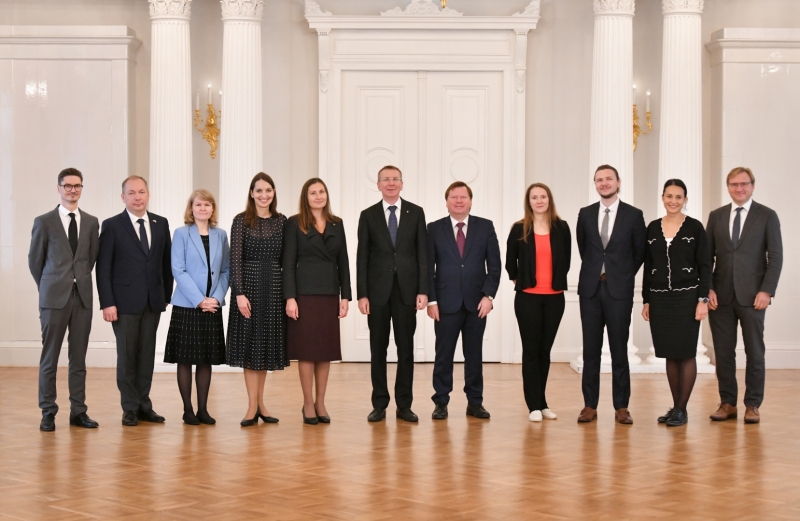On 4 October 2023, the President of Latvia Edgars Rinkēvičs established the State Competitiveness Council* (hereinafter – the Council). Its purpose is to provide support to the President in the implementation of the functions set out in the Satversme of the Republic of Latvia and develop proposals for strengthening the competitiveness** of the country in the fields of education, science, and entrepreneurship.
President Edgars Rinkēvičs on the tasks of the Council:
For Latvia to be a prosperous, strong, and modern society, it is necessary to significantly increase the pace of our country's economic growth and competitiveness. I see Latvia's competitiveness as part of our security strategy. The more closely we are integrated into global markets, the more secure our country will be. At present, there are obstacles in the interaction between education, science, and business that hinder the development of innovation. I believe that one of the main tasks of the Council will be to develop concrete proposals and best practice recommendations on, for example, reducing various administrative and bureaucratic barriers to strengthen Latvia's competitiveness.
Latvia's performance on competitiveness and innovation indicators currently lags behind the European Union (EU) average:
- Latvia scores 88.6 on the EU Competitiveness Index (EU average – 100);
- Latvia scores 56.97 on the EU Innovation Index (EU average – 108.47);
- Latvia's level of well-being as a percentage of the EU average – 74 (EU average – 100).
The Council, established by the President of Latvia, brings together experts in the fields of education, science, and entrepreneurship. It acts as a strategic think-tank of the institution of the President of Latvia, drawing conclusions and developing models of action based on data and analysis, in order to achieve the defined objective and to contribute to improving Latvia's ranking in innovation and competitiveness indicators.
The Council may conduct its own research or draw on the views of other recognised institutions. For the purposes of its work, the Council may also call upon other experts in an advisory capacity, if this is necessary for the preparation of the Council’s proposals or for the carrying out of studies. The Council’s work shall take into account cooperation with Latvia’s international partners, including the Organisation for Economic Cooperation and Development (OECD), the World Bank, the European Commission, CERN, and the Baltic Assembly.
The Council’s main tasks:
- Prepare an analysis of current educational, scientific, and economic processes and trends, identifying potential opportunities for improvement;
- Propose recommendations and alternative options for decision-making to enhance competitiveness;
- Develop proposals, based on a scientific and analytical approach, for the necessary legislation or development planning documents to address identified gaps or administrative barriers and promote competitiveness;
- Submit the Council’s analysis and proposals in the form of a report at least every six months to the President of Latvia for consideration and possible further progress;
- Promote discussion on development scenarios and motivate active public participation in the debate;
- Develop cooperation with other experts and scientists at the international level.
Composition of the Council
The composition of the Council shall be approved by the President of the Republic of Latvia. It may be amended or supplemented.
Chairperson of the Council: Dr. rer. pol. Arnis Sauka, Professor, Stockholm School of Economics in Riga, Head of the Council at the Vidzeme University of Applied Sciences
Members of the Council:
- PhD Daunis Auers, Professor, Faculty of Social Sciences, University of Latvia, Director of the doctoral study programme ‘Social Sciences’;
- Kristīne Bērziņa, Managing Director, German Marshall Fund North;
- Dr. h. c. Uldis Biķis, Chairman of the Supervisory Board of JSC ‘Latvijas Finieris’;
- Liene Briede, Vice-Rector of Innovation, Riga Technical University, Member of the European Innovation Council;
- Dr. phys. Guntars Kitenbergs, Senior Researcher and Head of the Department of Physics, Faculty of Physics, Mathematics and Optometry, University of Latvia;
- Sanita Mertena, Director of the State Law Department of the Ministry of Justice;
- Dr. chem. Elīna Pajuste, Senior Researcher, Radiation Chemistry Laboratory, Institute of Chemical Physics, University of Latvia;
- Dr. biol. Vita Rovīte, Senior researcher, Latvian Biomedical Research and Study Centre and Head of the Latvian National Biobank – Genome Database of Latvian population;
- Dr. sc. ing. Andris Šutka, Director, Institute of Materials and Surface Engineering, Riga Technical University;
- Agnese Veckalne, Chairperson of the Board of the Latvian Startup Association, Chief Operating Officer of the start-up ‘Longenesis’;
- Arkādijs Zvaigne, PhD student at Harvard University, Research Director, Riga Business School, Riga Technical University.
* According to Article 7.1 of the Law ‘On the Provision of Functioning of the President of Latvia’.
** The Council sees competitiveness as Latvia’s educational, scientific, and entrepreneurial advantage in the face of global competition.




